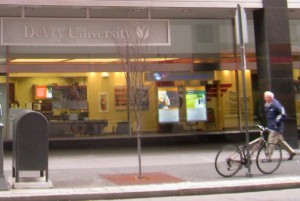Alleged 'Diploma Mills' Produce Fewer Diplomas Than Public Colleges
Last month, we asked whether for-profit universities are “diploma mills” or just convenient scapegoats for the nation’s mounting student debt.
But wouldn’t a diploma mill produce — well, you know — diplomas?
While statistics have long shown student performance at for-profits lags behind other colleges in many areas of student performance, defenders have been able to downplay these numbers since for-profits tend to educate more “high risk” students.
A report the Government Accountability Office released last week, though, showed fewer students at for-profit colleges earn degrees than at not-for-profit and public institutions — even after statistically controlling for age, race, and income.
But academics cautioned lawmakers to restrain the urge to use the new numbers as artillery in a battle to ramp up regulations on for-profit universities.
Students from for-profit schools had…
- …higher graduation rates for certificate programs
- …similar graduation rates for associate’s degree programs, and
- …lower graduation rates for bachelor’s degree programs than students from nonprofit and public schools.
Despite for-profit university’s students successes in one- and two-year programs, the report shows most for-profit students — 65 percent — are enrolled in four-year programs. (Public college enrollment is about 50-50 for two-year and four-year degree tracks.) The GAO continues:
Students from for-profit schools had similar earnings, but higher unemployment than students from nonprofit and public schools
Bachelor’s degree recipients from for-profit schools had higher total student loan debt than bachelor’s degree recipients from nonprofit and public schools.
For-profit schools had higher default rates than 4-year public schools, but results were mixed when comparing for-profit schools with other types of schools.
While for-profits have been getting bruised in the media lately, it’s worth noting that alternatives to for-profit colleges have their pitfalls too. As we’ve written, five-year completion rates at two-year public colleges have slipped in the past ten years.
Sen. Tom Harkin, D-Iowa — a leader of a Congressional charge for stricter controls on for-profit colleges — issued a joint statement with Illinois Democrat Dick Durbin to call for more regulation:
What this report shows is that the industry’s long-standing excuse — that it’s the students’ fault that the schools have such poor success rates — does not hold. Instead, as our investigation has uncovered, it’s the schools that go out and recruit these students using taxpayer dollars but fail to provide them with a quality education. This is what we’ve been saying all along: the problem is not the students, but the schools.
David Deming, Claudia Goldin, and Lawrence Katz ran similar statistical controls in their Harvard University study and found similar performance results for degree completion.
But they came to a much more nuanced conclusion than Harkin, writing for-profits — despite their obvious flaws — are better at meeting the quickly-shifting demands of a changing job market than public or not-for-profit universities.
“Regulating for-profit colleges is tricky business. The challenge is to rein in the agile predators while not stifling innovation,” the authors wrote.
As The Washington Post reports, the Obama administration has already tightened rules governing for-profit colleges, effectively threatening to shut down those that cannot prove enough of their graduates are earning enough to pay down their high student loan burdens.
Take a look at the GAO report and tell us what you think.
[documentcloud url=https://www.documentcloud.org/documents/272220-gaofpcolleges.html format=normal sidebar=false ]

